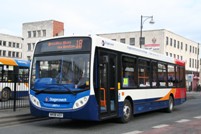
Stagecoach commissioned a report into Nexus’ QC figures from economic consultancy Oxera
An independent report commissioned by Stagecoach from economic consultancy Oxera has shown Nexus overstated the “benefits” of its bus contract plans by at least £310m.
Oxera reviewed the model used by Nexus to underpin its proposals to introduce a Quality Contract Scheme (QCS) in the North-east. It found a series of flaws in the model, with several elements of the Nexus plans based on incorrect assumptions and claims “not supported by the evidence available.”
Some claims were contradicted by research commissioned by the DfT and even Nexus itself. One serious finding in the report centres on Nexus claims around the impact of so-called “soft measures under a QCS, including smart ticketing and a customer charter.
The Oxera report said there was no evidence zonal ticketing would increase bus use and a 2009 DfT report found it may even reduce it. Previous research for Nexus by consultants MVA “consistently found ticketing was not a priority for bus users.”
Oxera says there was also limited evidence for Nexus claims of a customer charter leading to increased bus use. Removing the unfounded uplift from these elements from the Nexus model reduced the alleged financial benefit of a QCS by nearly 40%, which amounts to at least £310 million.
Oxera concluded: “In deriving its model Nexus appears to have made assumptions about inputs and the outcomes of different interventions which are not adequately supported by the evidence available. Given the feedback effects in the model, this may have significant impacts on outcomes. In light of this, the evidence presented by Nexus thus far to suggest the proposed QCS would lead to net welfare gains should be treated with caution.”
Stagecoach North East MD Phil Medlicott said: “This report exposes a multi-million-pound black hole in the Nexus plan. It is based on false assumptions, unproven claims, and unsupported numbers.
“Elected members are being misled by officials into taking a disastrous decision. Why destroy a system delivering high satisfaction for a flawed experiment?”
The Oxera report also found:
- Nexus presented no evidence the actions of bus operators were resulting in a decline in passenger numbers.
- Other possible explanations of patronage reduction in the North East were not considered by Nexus, such as the relationship between increasing car ownership and falls in bus use and the expansion of the Metro system.
- Bus use in the North-east is increasing – from 129.3m in 05-06 to 140m in 11-12 according to Nexus’s own draft bus strategy
- Bus operator costs have risen “faster than inflation” over the eight year period from 2004-11.
- Lower public sector support for buses in metropolitan areas compared to London. Public support per passenger journey in London is 29.6p compared to 22.2p in metropolitan areas.
“The evidence put forward by Nexus does not appear to provide sufficient support for the proposition where any potential problems in the bus market in the Tyne and Wear area can be addressed by a QC,” Oxera said. “Nexus has not examined in sufficient depth the reasons behind trends in the North-east bus market, nor has it set out how a franchising model might address the problems which have occurred.”
Nexus is pursuing QCS plans despite independent research by Passenger Focus the North-east has the highest bus passenger satisfaction in the country at 91%. Bus operators instead called for a partnership between themselves and Nexus to further improve the standard of services in the area.
In response, Bernard Garner, Director General of Nexus, said: “It is unsurprising an operator which takes 23% profit margin from the North East and whose CEO said he would rather drink poison than talk about a QCS should make these claims. We’ve always known some operators would set out to discredit an attempt to explore whether a system working in London and many world cities might work here.
“Change is needed as the number of fare-paying passengers is falling.
“We shared a working draft for a QCS with operators in August and asked for their input to refine proposals. The assumptions Stagecoach make for 10 years of future bus use are different to our own, but by getting bus firms involved, despite their opposition in principle to the idea of franchising, we can ensure any final proposals are robust and fully considered against the merits of a partnership.
“We’ve been clear from the start any scheme we propose must cost no more than the £62m the taxpayer now puts into local bus services, while looking to make better use of the £20m a year bus companies take out of the North East in profit.”


